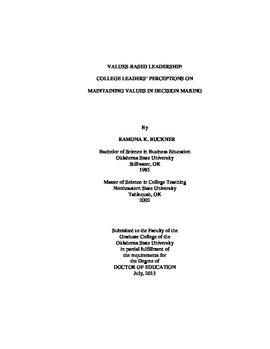| dc.contributor.advisor | Kearney, Kerri S. | |
| dc.contributor.author | Buckner, Ramona K. | |
| dc.date.accessioned | 2014-09-24T14:16:51Z | |
| dc.date.available | 2014-09-24T14:16:51Z | |
| dc.date.issued | 2013-07 | |
| dc.identifier.uri | https://hdl.handle.net/11244/11003 | |
| dc.description.abstract | Scope and Method of Study: The purpose of this study was to explore college leaders' experiences of negotiating conflicts between their personal values and those of the institution and its stakeholders. This qualitative study utilized symbolic interactionism and involved interviews with five college campus leaders from various institutions along with observations, and analysis of artifacts including photographs, mission statements, resumes, and organizational charts. | |
| dc.description.abstract | Findings and Conclusions: Analysis of interviews, observations, field notes and artifacts revealed that leaders experience conflicts in personal and organizational values in ways that involve emotions. The emotional aspect experienced by the leaders as they negotiated instances of conflicting personal and organizational values was unanticipated during the design of this study. As participants discussed the role of values and differentiated between personal and organizational values, emotions were an undeniable factor in negotiating conflicts. Emotions are involved in the moment of conflict, resolution of conflict, and the coping process that ensues. Cognitive Motivational Relational Theory (Lazarus, 1991) provided a perspective that allows understanding of the emotional side of leadership. The influence of personal values on the organization and the influence of organizational values on the leader have been identified in existing literature (Hood, 2003; Buell, 2008; Grojean, Resick, Dickson & Smith, 2004; Fernandez & Hogan, 2002) and the study participants confirmed that a relationship between the two exists. What has not been well documented is the emotion involved in maintaining this relationship. From happiness to guilt to anger, emotions play an undeniable role in decision making involving personal and organizational values. These campus leaders shared instances of conflicting values that give readers insight into the nuances of maintaining values during critical decision making moments and the emotions involved. | |
| dc.format | application/pdf | |
| dc.language | en_US | |
| dc.rights | Copyright is held by the author who has granted the Oklahoma State University Library the non-exclusive right to share this material in its institutional repository. Contact Digital Library Services at lib-dls@okstate.edu or 405-744-9161 for the permission policy on the use, reproduction or distribution of this material. | |
| dc.title | Values-based leadership: College leaders' perspectives on maintaining values in decision making | |
| dc.contributor.committeeMember | Harris, Edward L. | |
| dc.contributor.committeeMember | Curry, Katherine A. | |
| dc.contributor.committeeMember | Bailey, Lucy E. | |
| osu.filename | Buckner_okstate_0664D_12859.pdf | |
| osu.accesstype | Open Access | |
| dc.type.genre | Dissertation | |
| dc.type.material | Text | |
| dc.subject.keywords | cognitive motivational relational theory | |
| dc.subject.keywords | emotion | |
| dc.subject.keywords | organizational values | |
| dc.subject.keywords | personal values | |
| dc.subject.keywords | symbolic Interactionism | |
| dc.subject.keywords | values conflicts | |
| thesis.degree.discipline | Higher Education Leadership | |
| thesis.degree.grantor | Oklahoma State University | |
